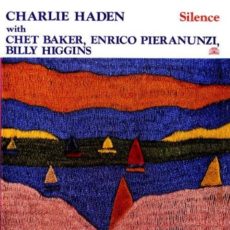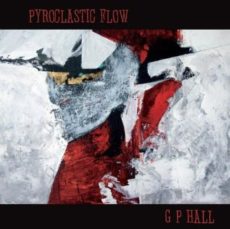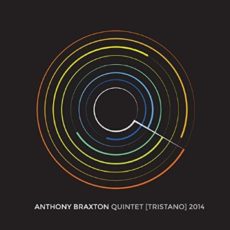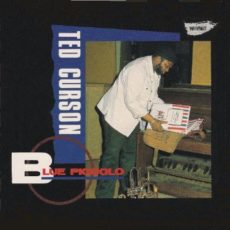
Daily Dose Of Jazz…
Charles Edward Haden was born on August 6, 1937 in Shenandoah, Iowa into a musical family who performed on the Haden Family radio show. He made his professional debut as a singer on the radio show when he was just two years old. He continued singing with his family until he was 15 but a bulbar form of polio affecting his throat and facial muscles sidelined him but a year earlier he had become interested in jazz after hearing Charlie Parker and Stan Kenton in concert.
Recovering from his bout with polio, Charlie began concentrating on the bass and soon set his sights on moving to Los Angeles, California to pursue his dream of becoming a jazz musician and in 1957 he realized his dream turning down a full scholarship at Oberlin College, which had no established jazz program at the time and attended Westlake College of Music.] His first recordings were made that year with Paul Bley, with whom he worked until 1959. He also played with Art Pepper for four weeks in 1957, and from 1958 to 1959, with Hampton Hawes whom he met through his friendship with bassist Red Mitchell and for a time shared an apartment with the bassist Scott LaFaro.
In May 1959, he recorded his first album with the Ornette Coleman Quartet, the seminal The Shape of Jazz to Come. Later that year, the Ornette Coleman Quartet moved to New York City, secured a six-week residency at the Five Spot Café that would represent the beginnings of free or avant-garde jazz.
By 1960, Haden’s narcotics addiction forced him to leave Coleman’s band, go into rehabilitation in 1963 in California, met his first wife and moved to the Upper West Side of New York City. He resumed his career in 1964, working with John Handy, Denny Zeitlin’s trio, performed with Archie Shepp in California and Europe and freelanced with Henry “Red” Allen, Pee Wee Russell, Attila Zoller, Bobby Timmons, Tony Scott, the Thad Jones/Mel Lewis Orchestra, Roswell Rudd, and returned to Ornette Coleman’s group in 1967.
Charlie went on to work with Keith Jarrett’s trio and his American Quartet, organized the collective Old and New Dreams, which consisted of Don Cherry, Dewey Redman, and Ed Blackwell from Coleman’s band. He founded his first band, the Liberation Music Orchestra at the height of the Vietnam War, working with arranger Carla Bley, exploring free jazz and political music. The original lineup consisted of Haden and Bley and Gato Barbieri, Dewey Redman, Paul Motian, Don Cherry, Andrew Cyrille, Mike Mantler, Roswell Rudd, Bob Northern, Howard Johnson and Sam Brown.
Over the course of his half-century career he established the Jazz Studies Program at California Institute of the Arts in Valencia, been honored as Jazz Educator of the Year and as a leader has won several Grammy Awards, recorded forty-six albums as well as 134 albums as a sideman with Geri Allen, Ray Anderson, Ginger Baker, Bill Frisell, Kenny Barron, Beck, Paul Bley, Jane Ira Bloom, Michael Brecker, Henry Butler, Alice Coltrane, John Coltrane, Robert Downey Jr., Dizzy Gillespie, Jim Hall, Tom Harrell, Joe Henderson, Fred Hersch, Laurence Hobgood, Rickie Lee Jones, Lee Konitz, Brad Mehldau, David Liebman, Abbey Lincoln, Helen Merrill, Pat Metheny, Bheki Mseleku, Yoko Ono, Joe Pass, Enrico Pieranunzi, Joshua Redman, Gonzalo Rubalcaba, John Scofield, Wadada Leo Smith, Ringo Starr and Masahiko Togashi.
Double bassist, bandleader, composer, educator and NEA Jazz Master Charlie Haden, who revolutionized the harmonic concept of bass playing in jazz passed away in Los Angeles, California on July 11, 2014, at the age of 76 after suffering from effects of post-polio syndrome and complications from liver disease.
![]()
More Posts: bass

Daily Dose Of Jazz…
Graham Peter Hall, generally known as GP Hall, was born on July 15, 1943, and raised in Hampton Hill, London, United Kingdom, where he was schooled in classical, flamenco and jazz. As a teenager he went on to play in the Odd Lot Band and set up the Odd Lot Club as a venue for their music, which in turn attracted more established bands and players for concerts.
As he became better known, Hall went on to play at more celebrated London venues including The Roundhouse, the Middle Earth club and a residency at the 100 Club. He would back Deep Purple, The Hollies, Chris Farlowe and played with John Lee Hooker, Sonny Boy Williamson and with Casey Jones & The Governors.
His musical approach broadened in the early 1970s where he spent time studying with Romani musicians and flamenco guitarist Manitas de Plata, became involved in more avant-garde work, writing, producing and performing, and became the musical director for the multi-media performance art group Welfare State International.
By 1972 GP composed and recorded The Estates on Prototype Records, followed three years later by his sophomore project Manifestations. But around this time, his promising career fell into a fifteen-year depression due to personal trauma. It was until the Eighties that he re-emerged into the music world with his twenty-nine track Colors (Movements) a series of instrumental albums on the Kenwest label. The 90s saw the release of a solo album Imaginary Seasons on his own Imaginary Music label that was nominated for the Mercury Music Prize, followed by Figments Of Imagination in 1996 and an appearance on the Unknown Public compilation alongside guitarists Bill Frisell, Frank Zappa, John Zorn and Robert Fripp.
Into the new millennium the guitarist has continued to record new and old music combining them with live performances, created eclectic instrumental and industrial inclined works, recorded several unreleased albums and collaborated with percussionist Justin Ash, painter Alistair Michie, Lol Coxhill, Paul Rutherford, Jeff Clyne, John Ellis and Lyn Dobson, among others.
Hall invented the musical genre known as Industrial Sound Sculptures, draws on classical, rock, jazz, flamenco, folk and blues styles and performs mainly in the free jazz and avant-garde genres, though much more melodic. He uses a variety of techniques such as slides, fingerpicking and found implements like crocodile clips, palette knives, velcro strips, an antique psaltery bow and wind-up toy to create a variety of different sounds.
Guitarist GP Hall is adept with electric and electronic playing but is also known for his particular virtuosity as an acoustic guitarist, an expert flamenco guitarist, and an accomplished classical-style player. He also plays a customized Shergold six-string bass guitar featuring a half-fretted, half-fretless fretboard and has been known to dabble in playing other instruments such as double bass, piano, soprano saxophone and varied percussion, and vocals as he continues his musical journey.
![]()
More Posts: guitar

Daily Dose Of Jazz…
Tomasz Stańko was born on July 11, 1942 Rzeszów, Poland and his first encounters with jazz were through Voice of America radio programs and U.S. State Department tours. Coming of age in Communist Poland he was impressed by the correlation jazz had with a message of freedom. In 1958 he saw his first jazz concert given by Dave Brubeck.
Coming to prominence in the early 1960s alongside pianist Adam Makowicz in the Jazz Darings, the group is considered one of the first groups to play free jazz in Europe. Stańko later collaborated on pianist Krzysztof Komeda’s pivotal 1966 album Astigmatic, then formed at quintet in 1968 with Zbigniew Seifert on violin and alto saxophone and in 1975 he formed the Tomasz Stańko-Adam Makowicz Unit.
Tomasz has since established himself as a leading figure not only in Polish jazz, but on the world stage working with Jack DeJohnette, Dave Holland, Reggie Workman, Rufus Reid, Lester Bowie, David Murray, Manu Katche, Taj Mahal, Chico Freeman, Howard Johnson, Don Cherry Arild Andersen, Jon Christensen, Bobo Stenson, Tony Oxley, Anders Jormin, was a member of Cecil Taylor’s big band and the Globe Unity Orchestra.
Losing his natural teeth in the 1990s, over time he developed a new embouchure with the help of a skilled dentist and monotonous practice. Trumpeter, composer and improviser Tomasz Stanko, who concentrates in the free jazz and avant-garde genres, continues to record for ECM Records, perform and tour globally.
![]()
More Posts: trumpet

Daily Dose Of Jazz…
Anthony Braxton was born June 4, 1945 in Chicago, Illinois. He studied philosophy at Roosevelt University and early in his career he led a trio with violinist Leroy Jenkins and trumpeter Wadada Leo Smith. He was involved with the Association for the Advancement of Creative Musicians (AACM) founded in his birthplace.
In 1969, Braxton recorded the double album For Alto, the first full-length album for unaccompanied saxophone. The album’s tracks were dedicated to Cecil Taylor and John Cage among others. The album influenced other artists like soprano saxophonist Steve Lacy and trombonist George Lewis, who would go on to record their own solo albums.
Joining pianist Chick Corea’s trio with bassist Dave Holland and Barry Altschul they form the short-lived avant garde quartet Circle around 1970. When Corea broke up the group to form Return To Forever, Holland and Altschul remained with Braxton for much of the 1970s as part of a quartet, rotating Kenny Wheeler, George Lewis and Ray Anderson. With Sam Rivers they recorded Holland’s This group recorded for Arista Records and the core trio with saxophonist Sam Rivers recorded Holland’s Conference of the Birds on ECM. In the 1970s he recorded duets with Lewis and with synthesizer player Richard Teitelbaum. In 1975, he released Muhal with the Creative Construction Company featuring Richard Davis, Steve McCall, Muhal Richard Abrams, Wadada Leo Smith and Leroy Jenkins. He would oo on to record through the 70s, 80s and early 90s wth Marilyn Crispell, Mark Dresser and Gerry Hemingway.
He performed at the Woodstock Jazz Festival, was awarded a MacArthur Fellowship, composed his Ghost Trance Music released on his now defunct Braxton House label, and the final Ghost House live recordings at the New York City Iridium club were released by Firehouse 12 label in 2007. He recorded a prodigious series of multi-disc sets of standards during the 1990 and early 2000s
Besides playing saxophone, Braxton also plays clarinet, flute and piano, performs and records in the avant-garde, improvisation, bebop and mainstream genres, composes operas, orchestral and classical compositions, and is an avid chess player. He is the author of multiple volumes explaining his theories and pieces, such as the philosophical three-volume Triaxium Writings and the five-volume Composition Notes.
Composer and instrumentalist Anthony Braxton has released well over 100 albums since the 1960s, has taught at Mills College in the Eighties, was Professor of Music at Wesleyan University from the 1990s until his retirement at the end of 2013, and in 2013, was named a 2014 National Endowment for the Arts Jazz Master.
![]()

Daily Dose Of Jazz…
Theodore Curson was born on June 3, 1935 in Philadelphia, Pennsylvania. He became interested in playing trumpet after watching a newspaper salesman play a silver trumpet, however, his father preferred he become an alto saxophonist like Louis Jordan. By the time he turned 10 years old he received his first trumpet.
Curson attended Granoff School of Music in Philadelphia and at the suggestion of Miles Davis, moved to New York City in 1956. He performed and recorded with Cecil Taylor in the late 1950s and early 1960s and his 1964 Eric Dolphy tribute composition Tears for Dolphy has been used in numerous films.
Ted is a familiar face in Finland performing annually at the Port Jazz Festival each year since its inception in 1966. In 2007 he played the Finland’s Independence Day Ball at the invitation of President Tarja Halonen.
Trumpeter Ted Curson recorded some twenty albums as a leader for Old Town, Prestige, Fontana, Atlantic, Freedom, EMI Columbia Interplay and Inner City record labels among many others. He has been a sideman on fifteen other albums with Andrew Hill, Nick Brignola, Charles Mingus, The NY Contemporary Five, Sal Nistico, Archie Shepp, Pepper Adams and a host of others until his death on November 4, 2012 in Montclair, New Jersey.
![]()
More Posts: trumpet


